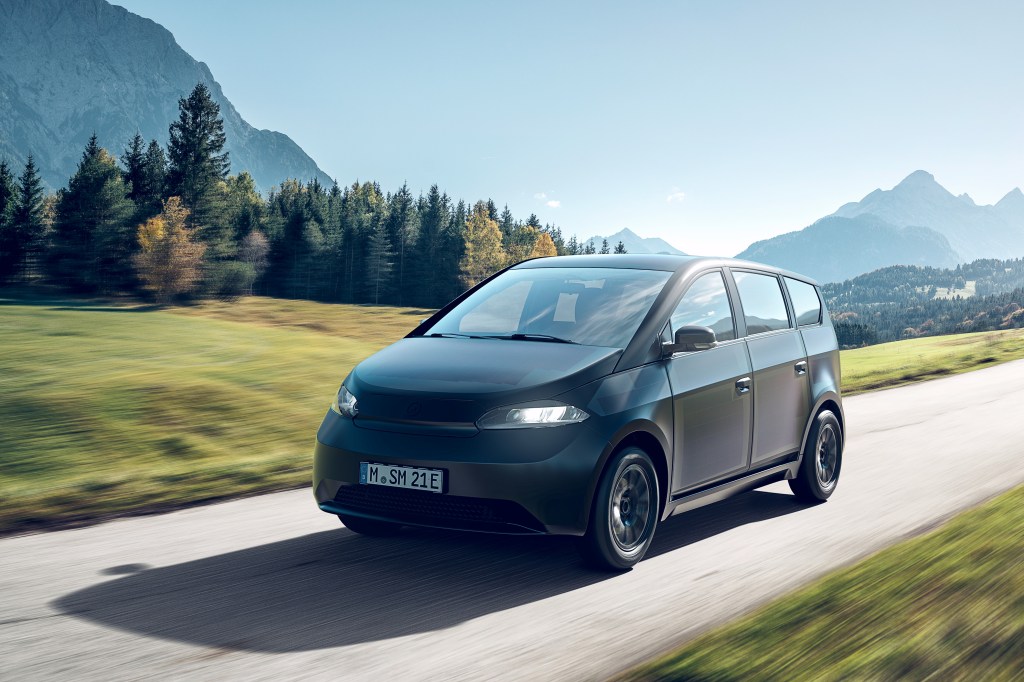The idea for Sono Motors, the company that wants to power every electric vehicle using solar power, started nine years ago in a Munich basement when two entrepreneurial 18-year-olds starting spitballing solutions to society’s dependence on fossil fuels. Jona Christians and Laurin Hahn, Sono Motors’ co-founders, weren’t that into cars, but they recognized how much transportation contributes to the burning of fossil fuels and thought that would be a good place to start.
“We came up with a vision to integrate solar on every vehicle and thought, Okay, what do we need for that?” Hahn told TechCrunch.
They started on the construction of a solar electric vehicle pre-prototype to prove that renewable energies can help solve the transportation emissions problem, and by 2015, they had a working model. The following year, Christians and Hahn brought on creative director Navina Pernsteiner to co-found the business and establish Sono Motors as a company and brand.
On Wednesday, Sono Group, the parent company to Sono Motors, went public. It opened for trading on the Nasdaq at $20.06 after the IPO was initially priced at $15, but shares hit a high of $38.74 before the market closed.
The company’s path to market is twofold. It has secured 16,000 preorders of the Sion, the company’s first solar electric vehicle, at an average down payment of $3,000. The compact, five-door, family-friendly hatchback, which will cost $28,700, should make it to consumers by the first half of 2023. Sono is also working with companies to integrate its solar technologies into other vehicles. At the start of this year, Sono announced that it would license its solar body panel technology to other companies and named electric autonomous shuttle company EasyMile as its first customer.
The Sion
The Sion is expected to have a range of 190 miles using a 54 kwH lithium iron phosphate (LFP) battery, supplied by China’s BYD, that is considered to be more sustainable because it doesn’t have manganese, nickel or cobalt — precious metals that have a high environmental and ethical impact. While the car can be charged via a wall box, Sono reckons the sun, which drip feeds energy into the battery whenever it’s shining, can handle most of your daily commute.
“In Germany, for example, the average commuting range is 10 miles per day,” Christians told TechCrunch. “And with our unique technology we can cover per week 112 kilometers (~70 miles) on average just by solar, and that covers a lot of the daily commute so you don’t have to recharge the car so often. We have four times more range in our car compared to other electric vehicles with the same battery size but without solar integration. And that’s why we see this technology [having] such a great potential to bring EVs [to] the masses.”
The aluminum frame is covered in solar panels that are composed of over 248 integrated cells, according to the company, and the car will be equipped with onboard bidirectional charging, which would allow a consumer to use energy stored in the battery to power their homes or other electronic devices via the wall box. This feature, along with ride-sharing and car-sharing, will be enabled by the Sono app, which also acts as a digital key.
Most of the preorders for the vehicle have come from Europe, where the market launch will take place. 90% of those orders come from Germany or “German-speaking countries” and the remaining 10% comes from countries like the Netherlands, Spain, France, Italy and Sweden, where the vehicles will be manufactured. Sono has partnered with National Electric Vehicle Sweden (NEVS) to produce the vehicles in its former Saab factory. Christians says the factory should have capacity for 43,000 cars per year, with roughly 260,000 vehicles to be produced over seven years.
“One base” vehicle platform
Like many other automakers (GM, Arrival), Sono is developing a “one base” vehicle platform that it hopes to build future models on top of. The Sion is the first, but the company is also looking into producing a crossover passenger vehicle and a cargo van for last-mile delivery.
“We intend to use modular systems in the Sion, including the powertrain, chassis, thermal unit and certain electronics,” reads Sono’s filing with the Securities and Exchange Commission. “These modular systems can also be used for other car types without any, or only minor, modification.”
Solar technology integration and licensing
Sono’s solar technology has been engineered to enable both integration into other vehicles, as well as licensing for a range of vehicle architectures, like buses, trucks and last-mile vehicles. The company says it has already shipped pre-production samples to customers and has signed over 10 letters of intent and commercial contracts to explore strategic use cases.
“The transport and logistics industries in particular are very focused on total cost of ownership, where our solar integration can reduce running cost significantly,” reads the SEC filing. “We have several patents granted or within the filing process protecting our proprietary technology. Additionally, we have up to four years of advanced development ahead of who we believe to be our relevant competitors thanks to the patents, the testing of a large number of different polymer materials and the several relevant components for full solar integration, such as power electronics, especially the MCU.”
The MCU is Sono’s “maximum power point tracker central unit,” which the company says solves the issue of uneven sunlight exposure due to solar cells being mounted on different parts of the exterior.
Sono also thinks over half of the vehicles sold in 2030 will be suitable for solar retrofitting, including a third that are suitable for solar integration. Solar production prices have gone down and efficiency of solar cells has increased in recent years, which could have an impact on the ranges of EVs.
“Additionally, the steep increase in electric vehicle sales and the relatively slower increase in charging stations will create a bottleneck for the adoption of electric vehicles on a larger scale,” the company wrote in its filing. “We believe that even within the next few years, people living in apartments without private access to charging will be reluctant to buy electric vehicles due to uncertainty they will be able to find relevant charging options.”
Can Sono deliver?
Outsourcing production to NEVS is one of Sono’s self-described “key differentiators” in its strategy to produce the car efficiently and in a way that’s scalable. The others are doing only B2C sales, thus eliminating brick and mortar stores; no need for steel stamping because of the aluminum space frame; and no paint job because of the solar panels. But NEVS is a tricky one to rely on. The company is owned by the Chinese firm Evergrande, a company that has $88 billion in outstanding debt and is threatening a global financial crisis.
“NEVS has been our production partner since 2019 and we have been in close exchange ever since and currently remain so,” said Christians. “The production of the Sion is currently not affected by the restructuring. Facility preparations for pre-series production, planned in 2022, and Sion series production, planned for the first half of 2023, are running according to plan.”
Sono Motors is working on some backup plans, just in case. Plan A is still to manufacture the Sion at NEVS, but the company is exploring alternative scenarios and options, including the use of available capacities of other European contract manufacturers, according to Christians.
That said, NEVS is looking for a new owner, so maybe it’ll be alright for Sono in the end, but the startup probably can’t afford production delays. In 2018, Sono had 7,000 preorders that were meant to make it to customers by 2019. Those orders were postponed until 2021. If Sono doesn’t start delivering and scaling soon, it’ll face more than just reputation issues.
At $3,000 per preorder, Sono has about $48 million in the bank. But that alone won’t be able to get the Sion to production, and Sono is already hurting for cash. During the first half of the year, the company lost about $29 million, according to the SEC filing, with net losses resulting in an accumulated deficit of $123 million. The company said it would “continue to incur losses and depend on external financing in the foreseeable future at least until we commence material deliveries of the Sion and the time when we significantly scale our operations, including the monetization of our solar technology.”
Luckily, this IPO gave the company a nice cushion to get its Sion to production. The company raised $150 million by going public, money that will be used to develop the Sion with a focus on the next prototype generation made from serial components, according to the company.






























Comment